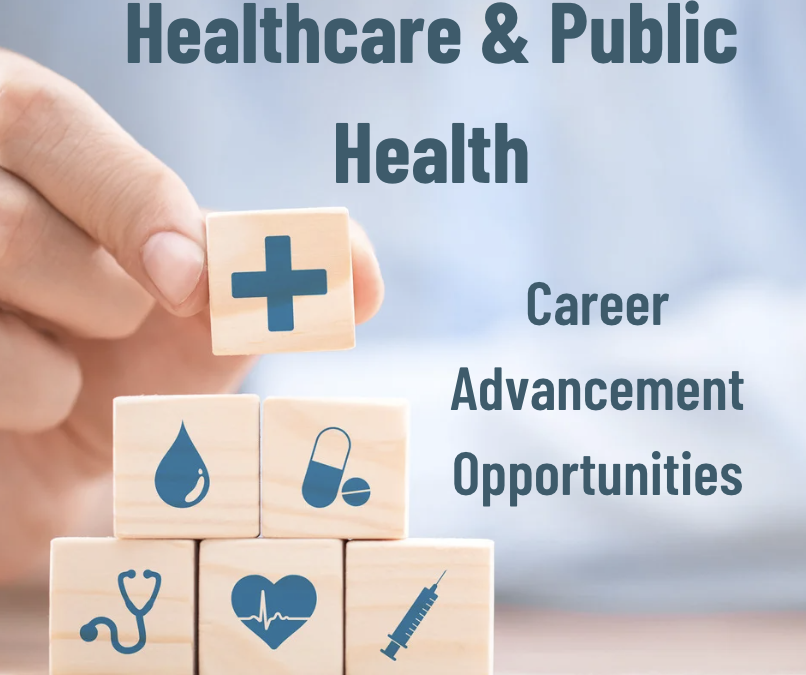By Vincent Dolgikh, MPH candidate at the University of Michigan School of Public Health
Healthcare and public health professionals will agree that pursuing a career in these fields goes hand in hand with lifelong learning. While many people pursue graduate and professional degrees, other training and certificate opportunities are often overlooked. These alternative chances to grow can provide crucial skills that can support any practitioner to better navigate their unique interests and goals. In this blog, we will offer a range of alternative career advancement opportunities that can better prepare you for a fulfilling healthcare and/or public health journey.
Career advancement opportunities are widely available, and while their scope and depth vary, being informed on all the options out there can help you better understand what type of path to take. For the purpose of this blog, we will separate these options into two broad categories classified as formal and informal career advancement.
Top five takeaways from this clip
- Assess your goals: understanding ambitions and objectives
- Consider your strengths and weaknesses: what areas need improvement
- Identify your career options: what opportunities are available to you
- Set a timeline and milestones: consider the steps needed to reach your goals
- Monitor your progress: revisit your plans on a regular basis
Formal Career Advancement
A formal career advancement opportunity is one which contains a structured progression through predefined paths, often tied to education, performance metrics, and clear job titles.
Below is a short list of relevant certifications for public health and healthcare professionals.
- Certified Emergency Manager: International Association of Emergency Managers
- The Certification Board of Infection Control and Epidemiology (CBIC) provides: certification in infection control (CIC), associate-infection and prevention control (a-IPC), as well as the advanced certification in infection prevention and long-term care certification.
- Continuing education credits:
- American Public Health Association Continuing Education Program
- Accreditation Council for Continuing Medical Education
- Certified Health Education Specialist: National Commission for Health Education Credentialing
- Continuing Nursing Education: American Nursing Association
- Certified in Public Health: National Board of Public Health Examiners
- Certified Patient Care Technician: National Healthcare Association
- Certified EKG Technician: National Healthcare Association
- Certified Phlebotomy Technician: National Healthcare Association
- Certified Professional Coder: The American Academy of Professional Coders
Aside from specific certifications, you can also pursue a range of training, seminars, and workshops. Looking in your local community or institution for opportunities is another great route to take. Here are just a few examples of healthcare and public health-related opportunities.
- The Federal Emergency Management Agency offers a wide range of training programs.
- The World Health Organization outlines six great emergency management courses.
- The Centers for Disease Control and Prevention lists various opportunities as well.
Informal Career Advancement
An informal career advancement opportunity is one which contains flexible growth driven by networking, skill development, and relationships, with a focus on expertise and mentorship.
Informal career advancement opportunities can range across many disciplines and provide the chance to grow professionally.
- Participate in health research and health development conferences for a great way to network with like-minded professionals, disseminate knowledge, and practice communication skills.
- Take initiative through volunteering on new projects, interventions, or written work that can demonstrate leadership skills.
- Publishing papers and other research or practice-related work can be a great way to contribute to healthcare and public health while staying involved with relevant issues.
- Mentorship and feedback are integral aspects of career advancement. Seeking advice from superiors or peers can help guide you towards self-improvement. Feedback allows you to be aware of your weaknesses and strengths, allowing you to pinpoint areas of needed growth.
- Self-directed learning is one way you can stay up to date with industry trends while challenging your knowledge base.
- Every individual should actively reflect on their skills and abilities in order to effectively advance their career.
- Be aware of your goals and aspirations that can inspire you to take a new direction in your profession.
We hope these resources and helpful tips further advance your career and allow you to pursue interests that continue to inspire you. Life-long learning is an essential part of healthcare and public health, especially in a world that is constantly changing. It is more important than ever for new and experienced practitioners to adapt to the uncertainty of a globalized world, whether it is supply-chain shortages or a pandemic. As a team, we can enhance health outcomes by preparing ourselves to handle them.

